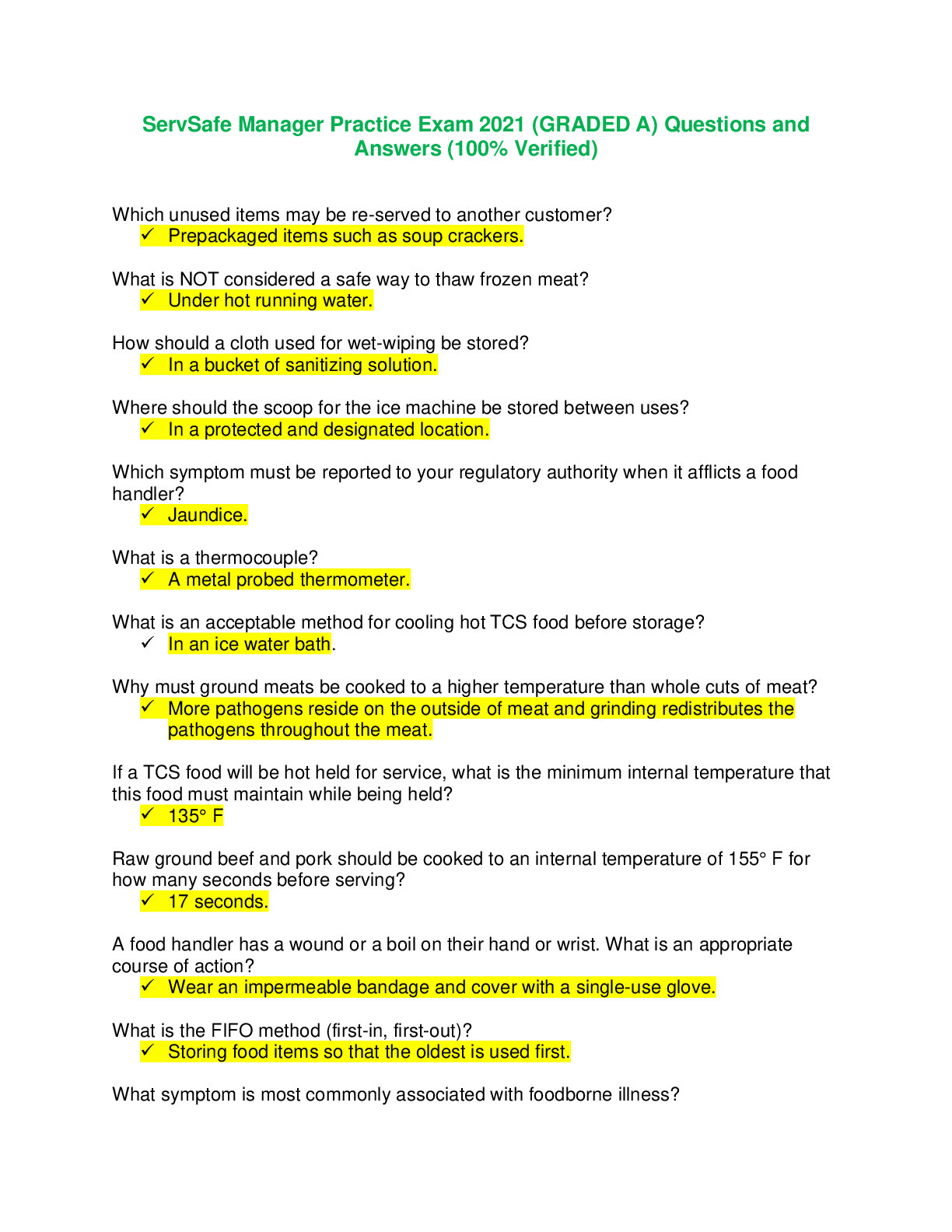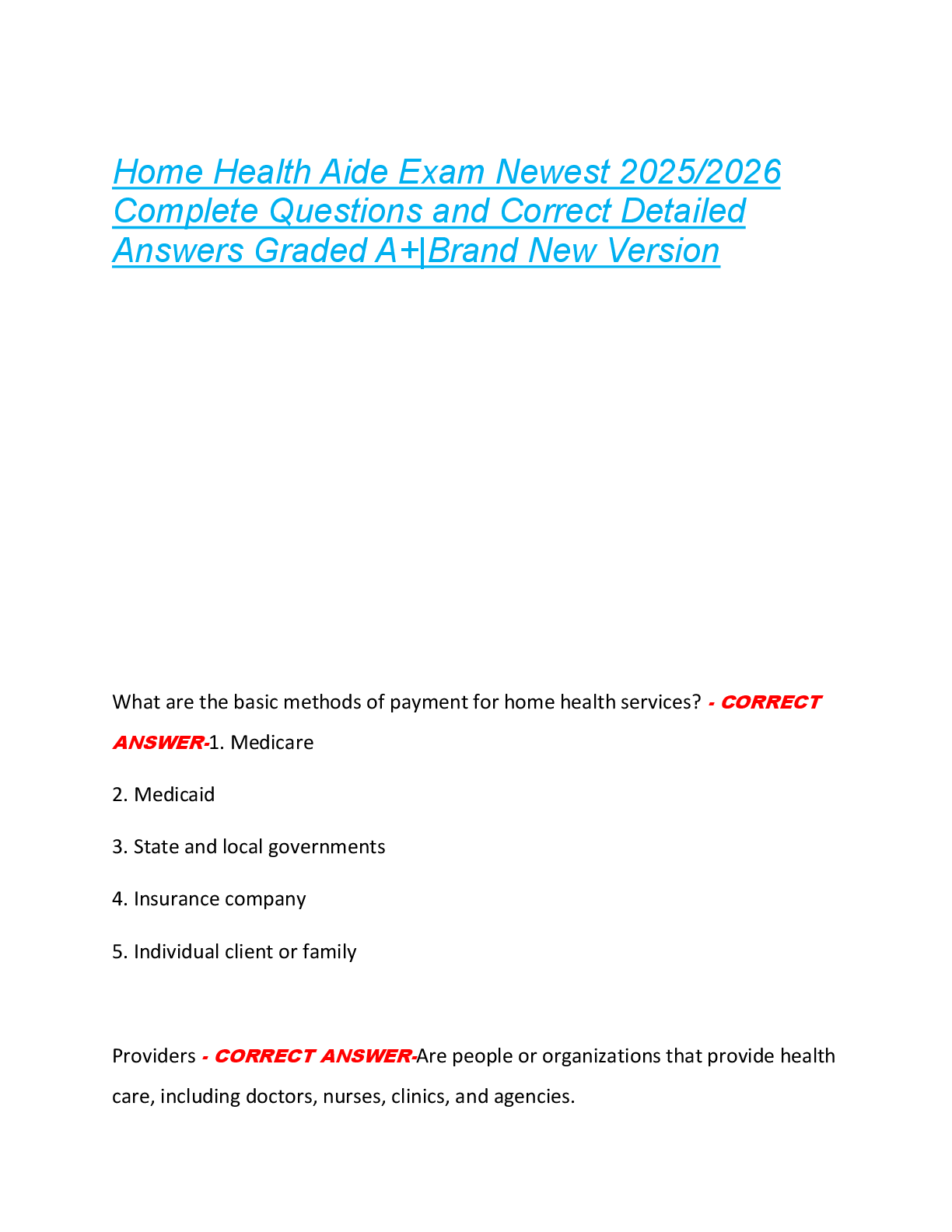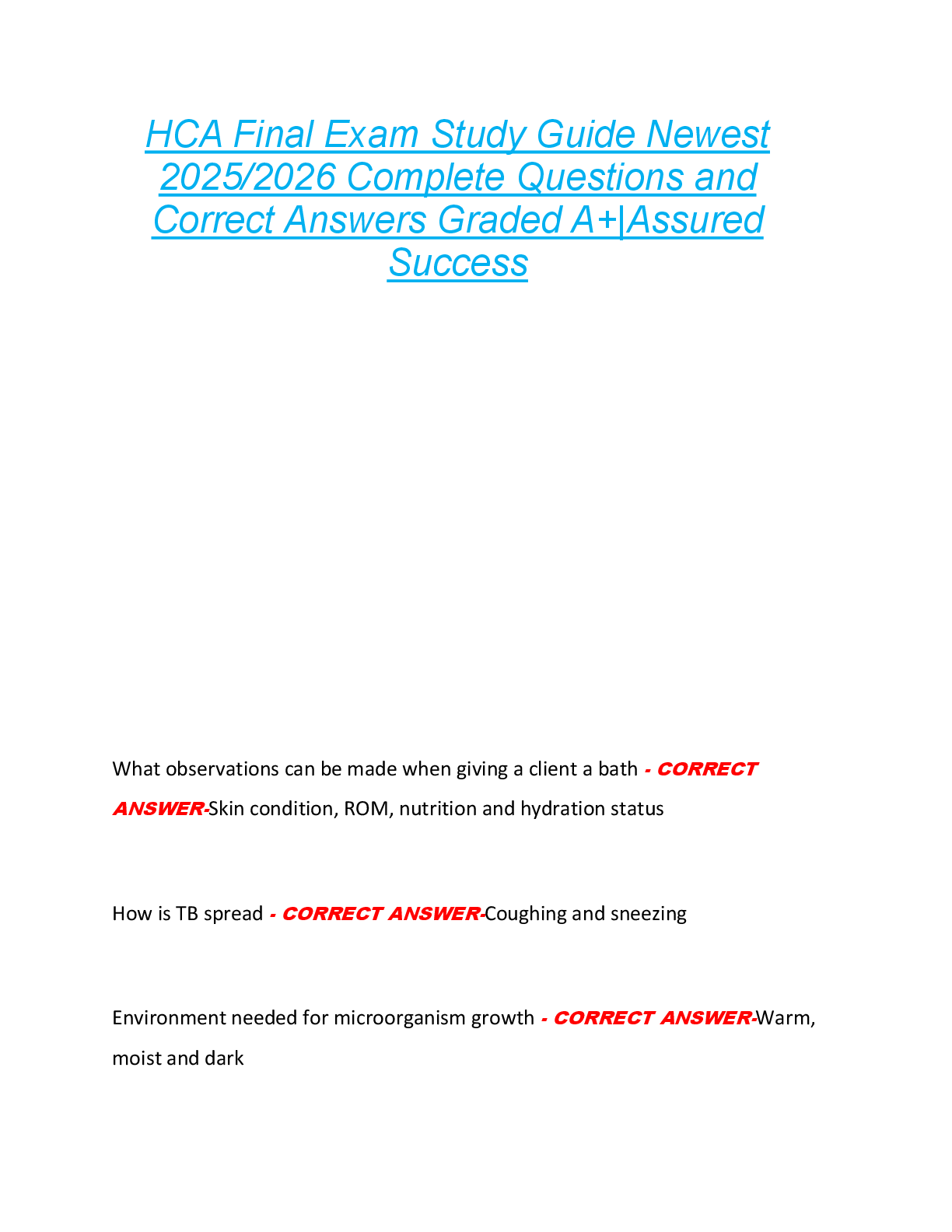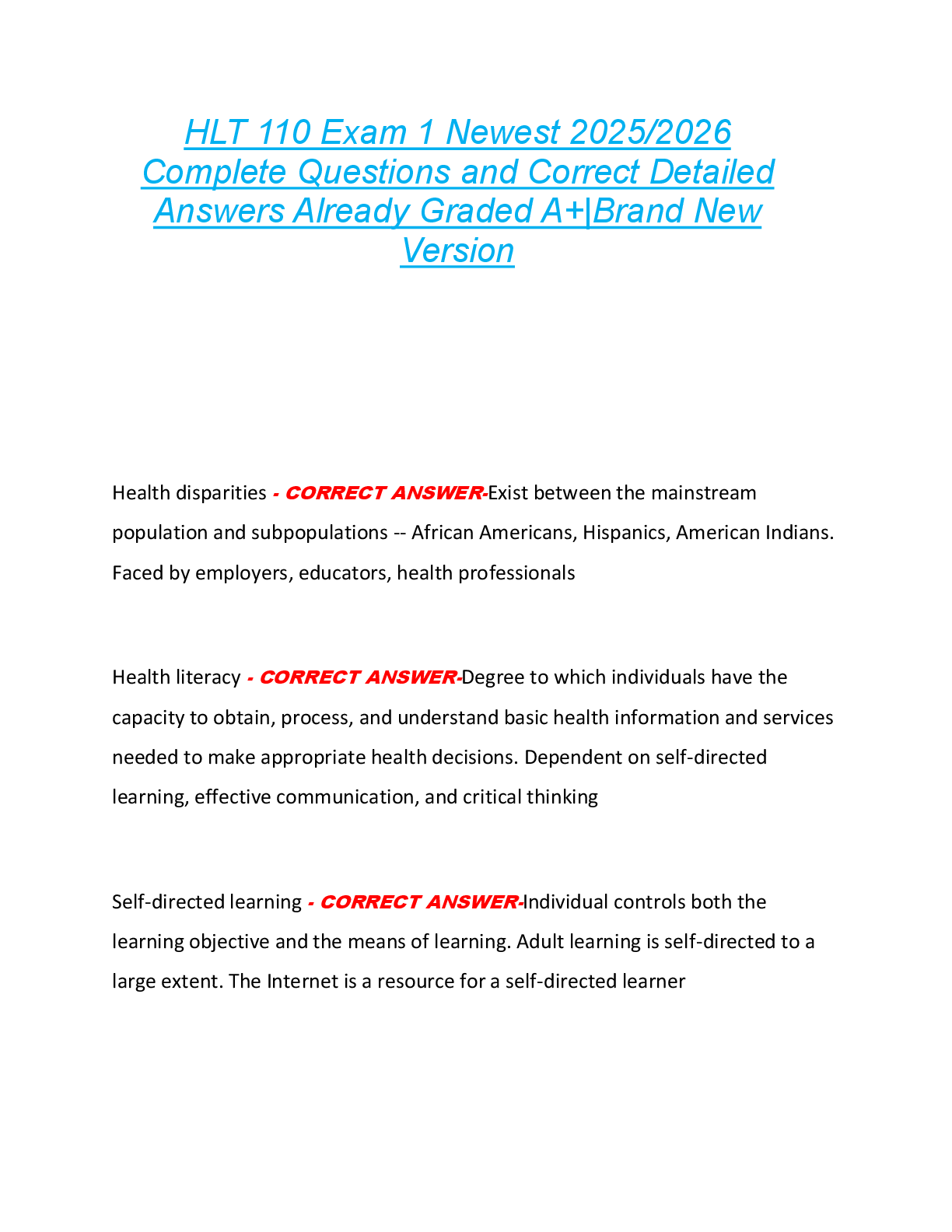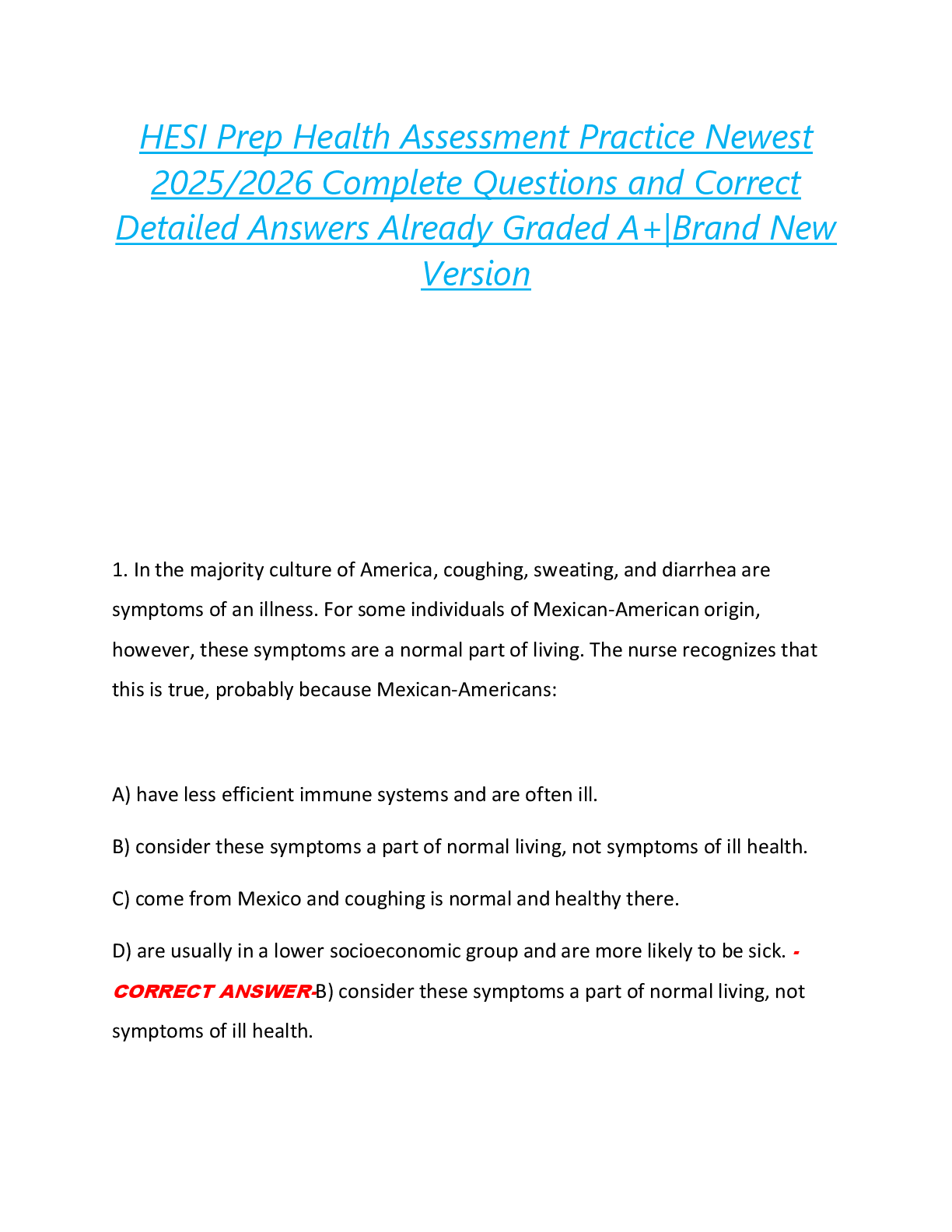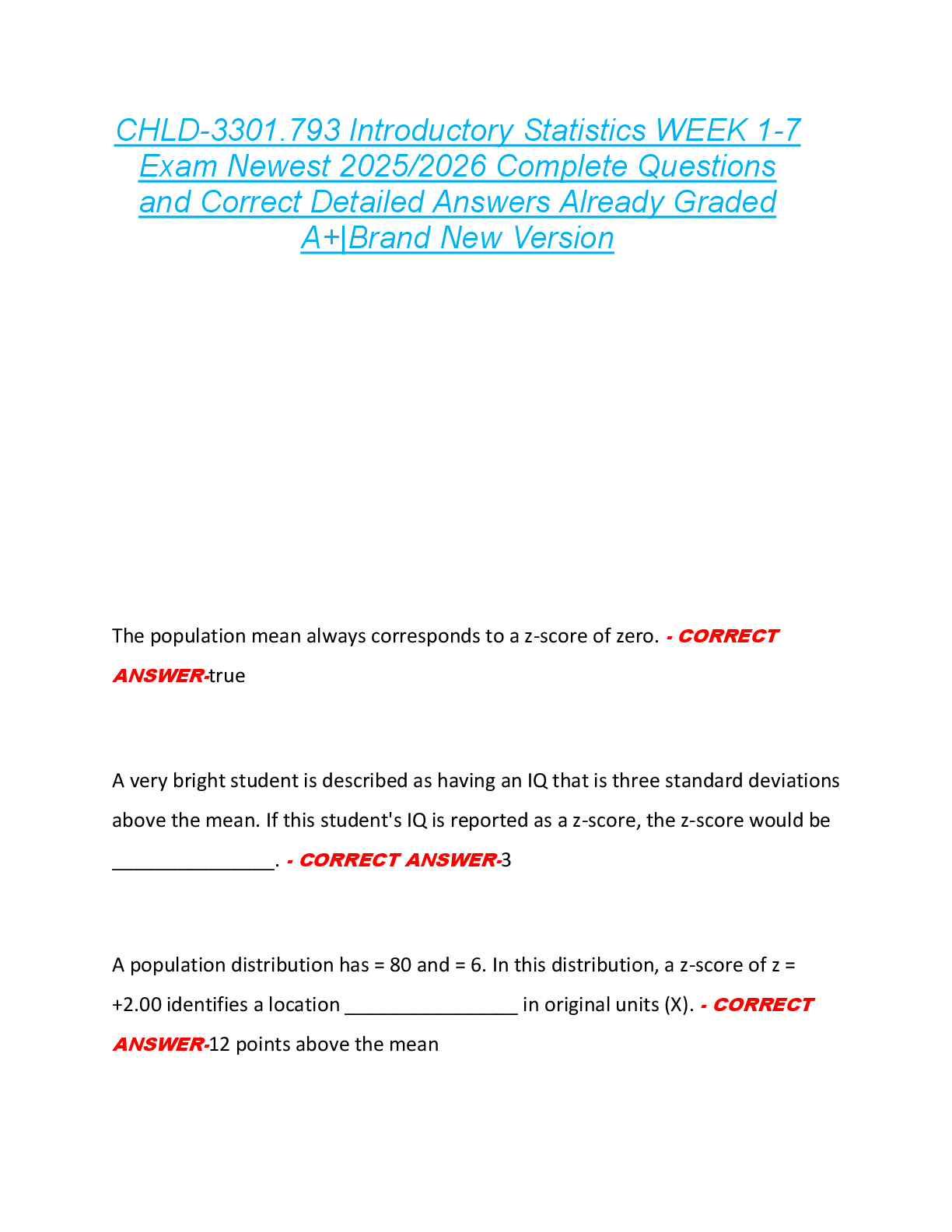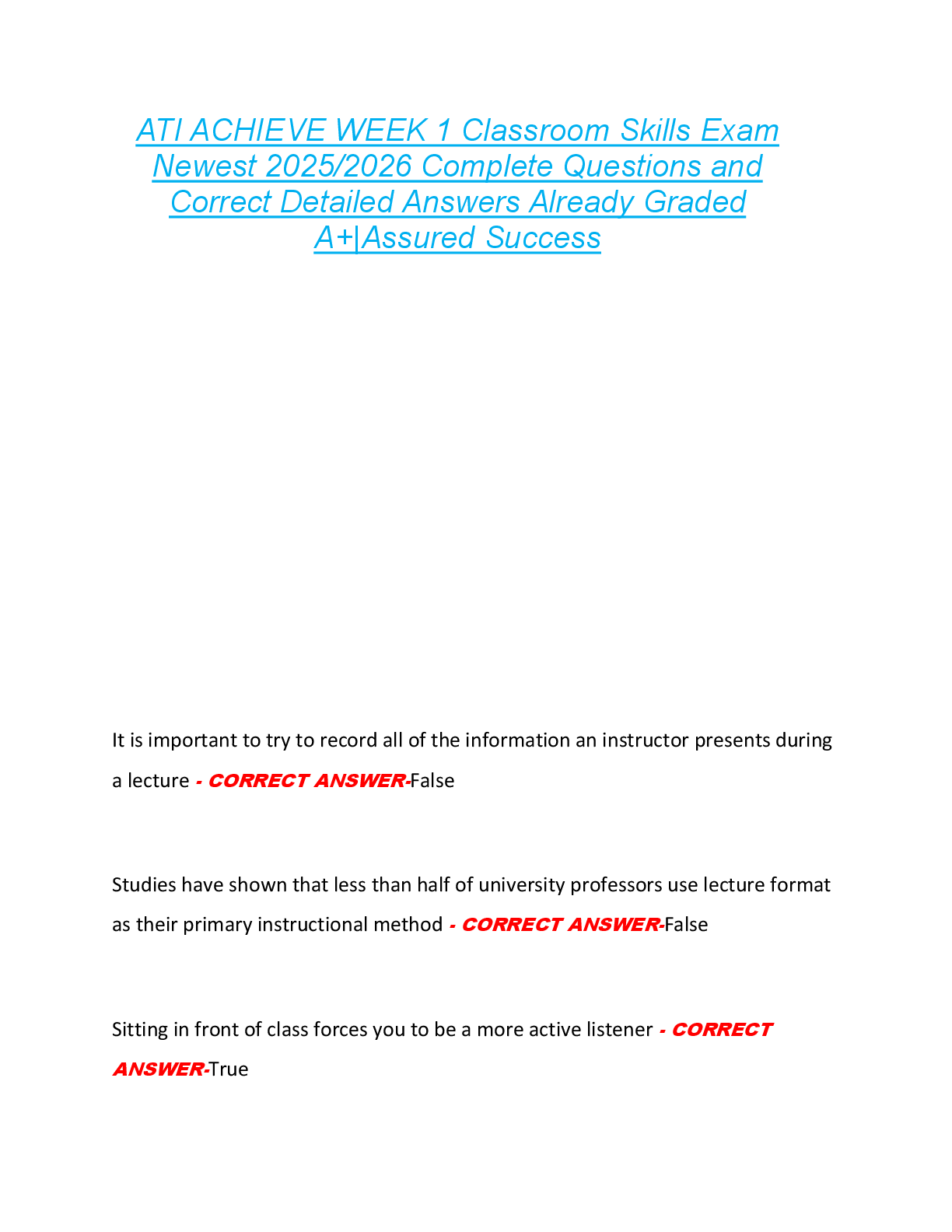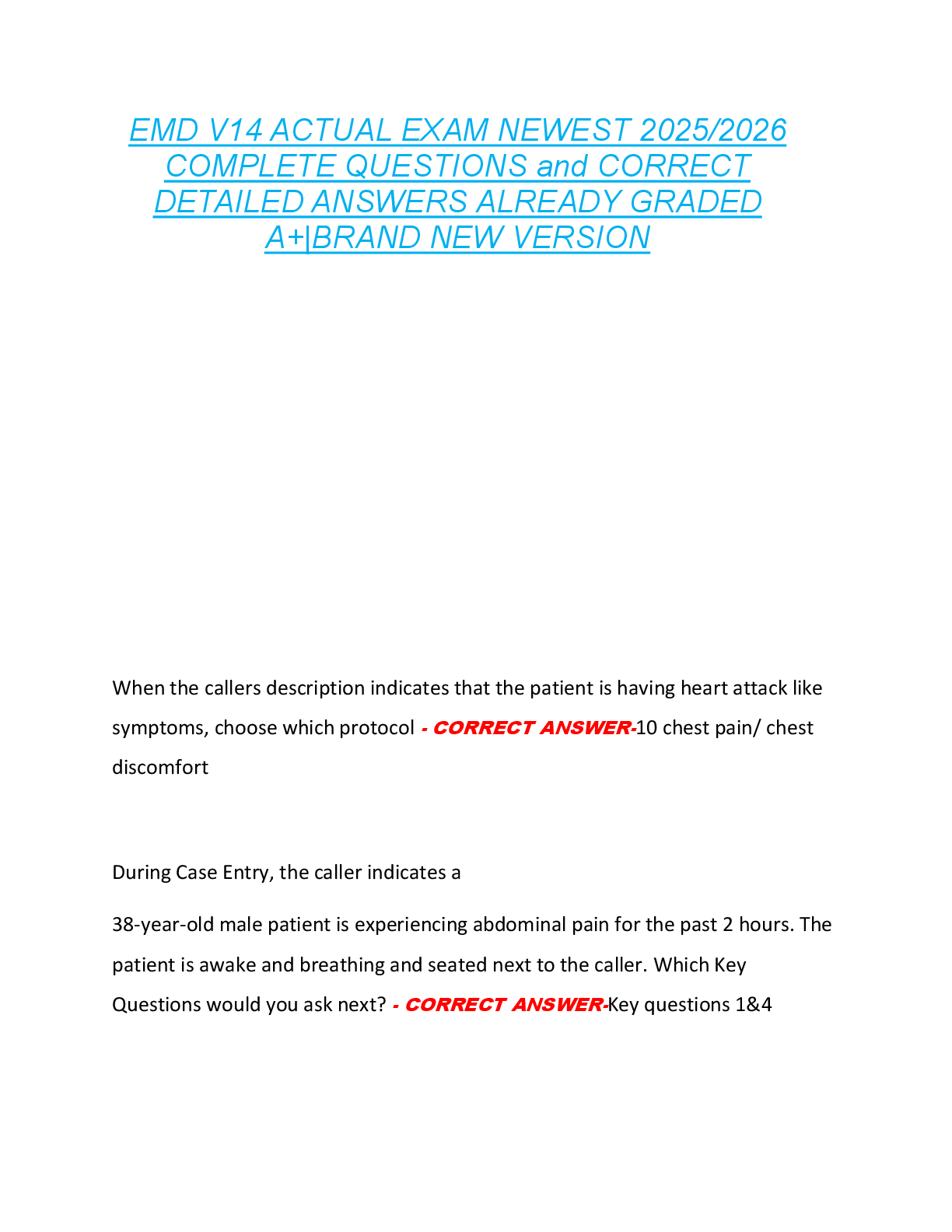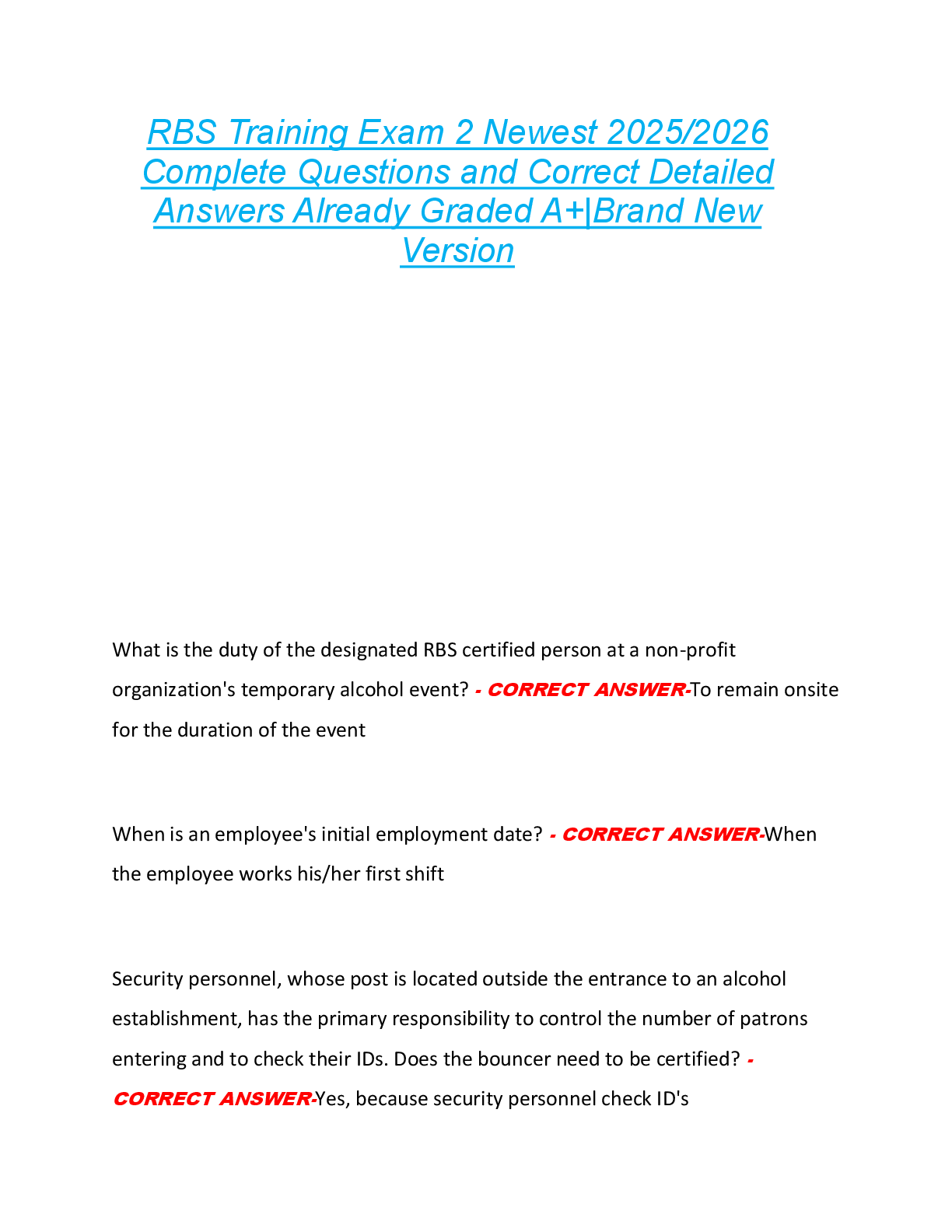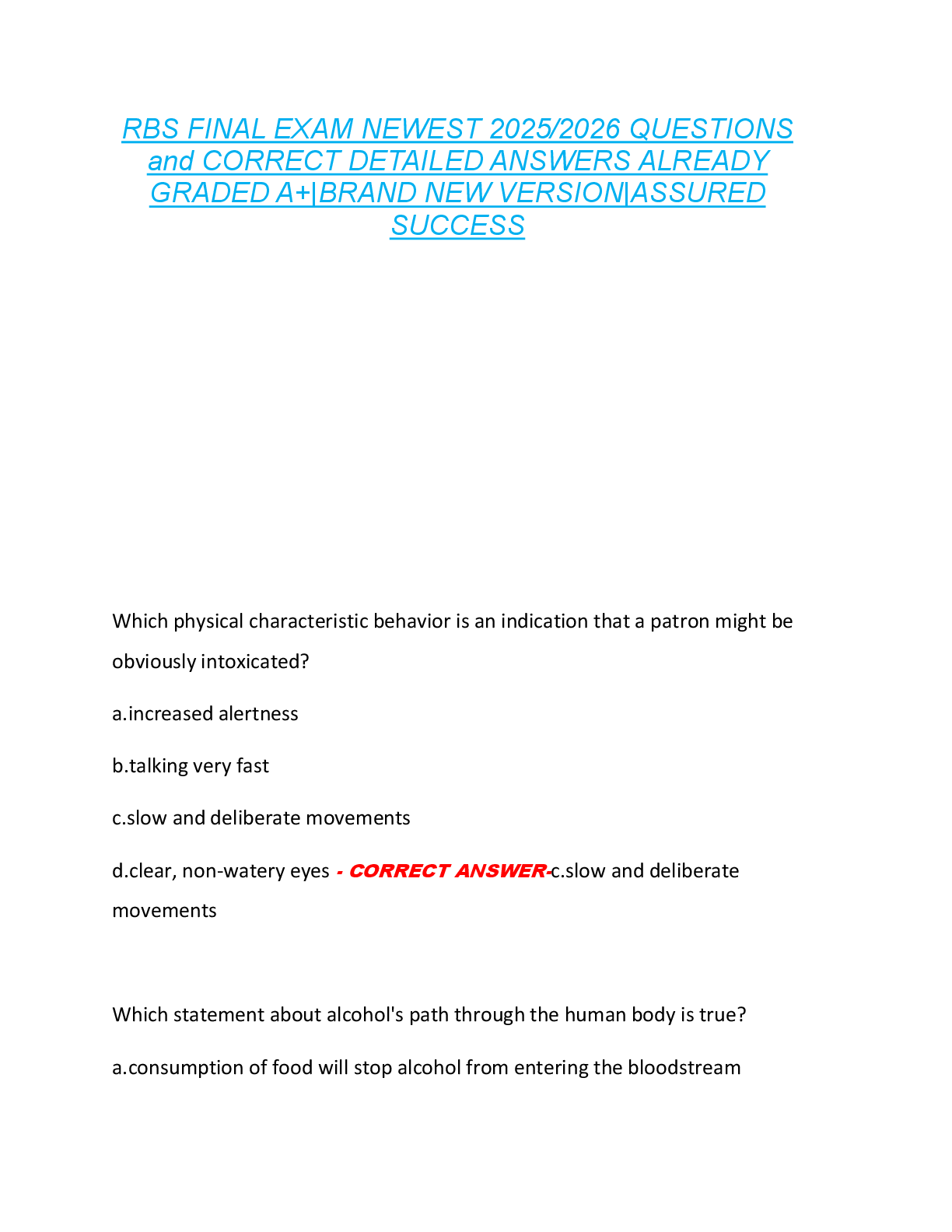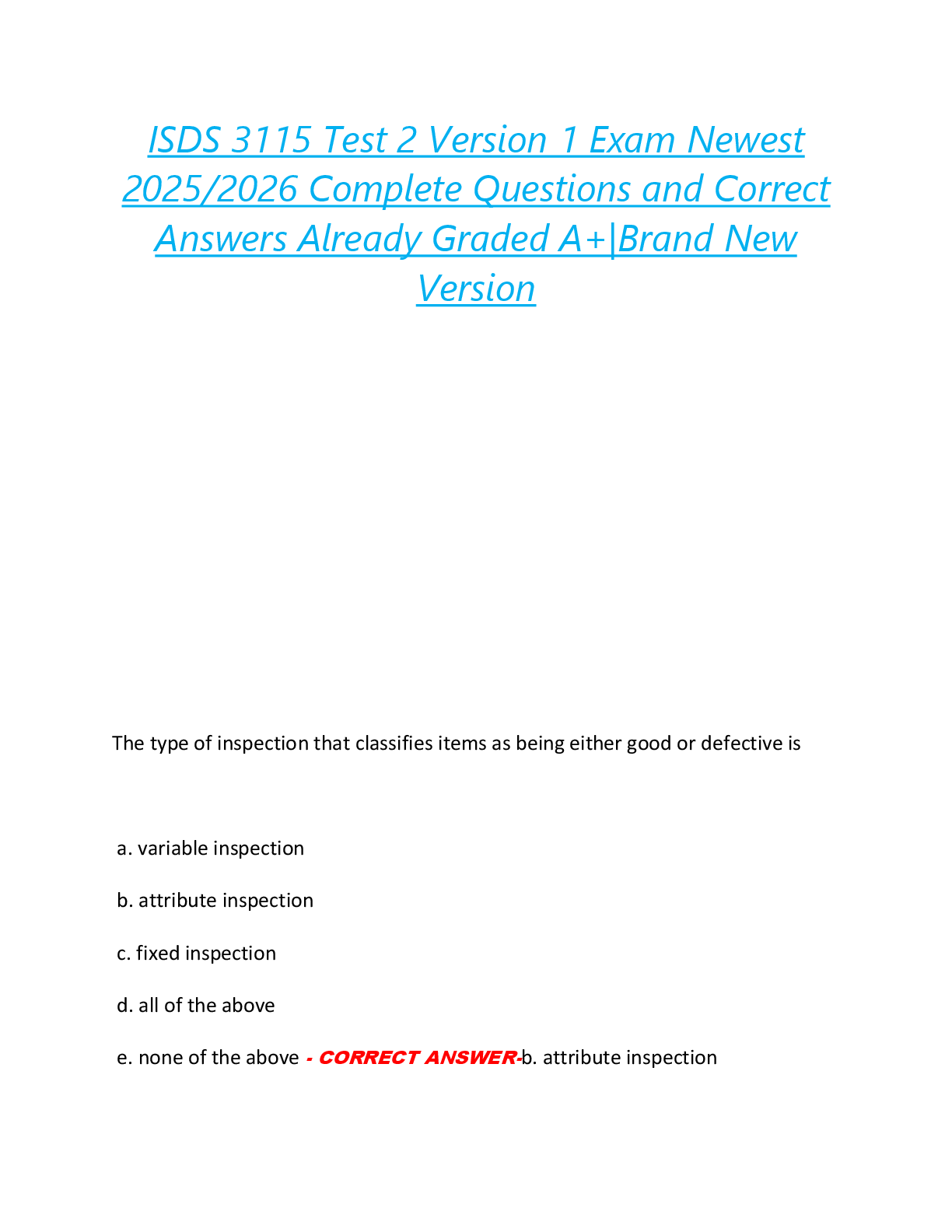POLI 330N Week 5 Quiz (100% CORRECT ANSWERS) | Questions and Answer elaborations | Best Rated Paper
Document Content and Description Below
Question 1 Question :
.
(TCO 5) Because they were often at war, ambitious European monarchs desperately needed revenues. Some of them started calling assemblies of notables to levy taxes. In re
...
turn for their “power of the purse,” these assemblies received a modest input into royal policies. Such were the beginnings of the .
Student Answer: American Congress French Estates General British Parliament Swedish Riksdag
Instructor
Explanation:
Chapter 13, page 207
Points Received: 3 of 3
Comments:
Question 2 Question :
.
(TCO 5) Countries with limits on government have usually had
feudal pasts, which suggests what about the dispersion of power?
Student Answer: Equal distribution of power is the only effective political
structure.
Power must be distributed by the working class.
Power should be concentrated among the lower classes.
Dispersion of power is good and concentration of power is bad.
Instructor
Explanation:
Chapter 13, page 207
Points Received: 3 of 3
Comments:
Question 3 Question :
.
(TCO 5) In a parliamentary system, voters directly elect .
Student Answer: members of parliament and the prime minister
Instructor Explanation:
members of parliament and the ministerial cabinet members of parliament only
the prime minister only Chapter 13, page 208
Points Received: 3 of 3
Comments:
Question 4 Question :
.
(TCO 5) Because of the separation of powers inherent in a presidential system, some scholars think that executive-legislative
is common in systems like that used in the United States.
Student Answer: cooperation stagnation deadlock insolvency
Instructor
Explanation:
Chapter 13, page 210
Points Received: 3 of 3
Comments:
Question 5 Question :
.
(TCO 5) The head of ministry is equivalent to the in the
United States.
Student Answer: chief of government
head of state
departmental secretary
premier
Instructor
Explanation:
Chapter 14, page 225
Points Received: 3 of 3
Comments:
Question 6 Question :
.
(TCO 5) Distinguish the process that a parliamentary system uses to oust a chief executive from the one available in the U.S. presidential system.
Student Answer: Parliamentary systems rely on impeachment and presidential
ones rely on constructive no confidence.
Parliamentary systems use constructive no confidence and
presidential systems have the option of impeachment.
The prime minister can dissolve parliament and the president
can resign from office.
Parliamentary systems can hold a vote of no confidence and
presidential ones have the option of impeachment.
Instructor Explanation:
Chapter 14, page 229
Points Received: 3 of 3
Comments:
Question 7 Question :
.
(TCO 4) Which of the following issues is a civil concern?
Student Answer: Extortion Theft Divorce Trafficking
Instructor
Explanation:
Chapter 15, page 243
Points Received: 3 of 3
Comments:
Question 8 Question :
.
(TCO 4) International law consists of and established
customs recognized by most nations.
Student Answer: treaties
Instructor Explanation:
ratification amendments cease-fires
Chapter 15, page 244
Points Received: 3 of 3
Comments:
Question 9 Question :
.
(TCO 4) What legal agency in the United States generates reputation-based ratings of prospective federal judges?
Student Answer: Judicial Ratings Bureau
Federal Bureau of Judicial Review American Bar Association
Office of Legal Assessment
Instructor Explanation:
Chapter 15, page 247
Points Received: 3 of 3
Comments:
Question 10 Question :
.
(TCO 4) Which of the following was an argument against granting the U.S. Supreme Court the power of judicial review?
Student Answer: Many feared that such a power would give the court a double
check and compromise its neutrality.
Some thought that such power would create untrustworthy
judges.
The founding fathers argued that judicial review would lead to
undue indictments by the court.
Drafters of the Constitution feared that few laws would ever be
set in stone.
Instructor Explanation:
Chapter 15, page 253
Points Received: 3 of 3
Comments:
* Times are displayed in (GMT-07:00) Mountain Time (US & Canada)
(TCO 5) Which of the following statements best defines feudalism?
Student Answer:
Instructor Explanation:
A political structure in which power is
dispersed evenly
A system of political power dispersed among
layers
A political structure in which power rests with
church leaders
A system of political power distributed to the
working class Chapter 13, page 207
-708804075 MultipleChoice 2 True
0 -708804075 MultipleChoice 2
Question 2. Question :
(TCO 5) Why do the responsibilities of legislative and executive powers often overlap?
Student Answer: Separation of powers is rarely clear-cut.
Separation of powers is rare among industrialized nations. Separation of powers is absolute.
Separation of powers grants obtuse levels of power to the executive branch.
Instructor Explanation:
Chapter 13, page 208
-708804074 MultipleChoice 5 True
0 -708804074 MultipleChoice 5
Question 3. Question :
(TCO 5) In Europe, a cabinet is equivalent to a U.S. .
Student Answer: administration Congress President legislature
Instructor
Explanation:
Chapter 13, page 209
Question 4. Question :
(TCO 5) What is the effect of divided government, such as that
used in the United States, on spending and policy formation?
Student Answer: It encourages unhealthy spending and foolish policies.
It holds down spending and foolish policies.
It encourages irresponsible spending because representatives
are held accountable for only a short amount of time.
Instructor Explanation:
It encourages responsible spending, but is slow to implement
policy.
Chapter 13, page 210
-708804072 MultipleChoice 12 True
0 -708804072 MultipleChoice 12
Question 5. Question :
(TCO 5) Who directly calls forth the leader of the largest party to take office with a cabinet and become the prime minister?
Student Answer: The voters Parliament The monarch
The House of Commons
Instructor Explanation:
Chapter 14, page 225
-708804071 MultipleChoice 14 True
0 -708804071 MultipleChoice 14
Question 6. Question :
(TCO 5) When it comes to electing officials, which factor matters the most to voters in both presidential and parliamentary elections?
Student Answer: Party affiliation
Political ideologies
Money invested in campaign Personality
Instructor
Explanation:
Chapter 14, pages 227–228
Question 7. Question :
(TCO 4) Unlike natural law, positive law uses .
Student Answer: the spirit of the law to make determinations
books to reach conclusions
judicial sentencing to determine case outcomes
jury selection to manipulate judgment
Instructor
Explanation:
Chapter 15, page 243
Question 8. Question :
(TCO 4) International law consists of and established
customs recognized by most nations.
Student Answer: treaties
ratification amendments cease-fires
Instructor
Explanation:
Chapter 15, page 244
Question 9. Question :
(TCO 4) Describe the primary jurisdiction of the U.S. Supreme
Court.
Student Answer: It makes initial rulings on all federal cases, civil and criminal.
Instructor
Explanation:
It rules on high penalty cases, including those with life
sentences and the death penalty.
Its jurisdiction is almost entirely appellate, from lower federal
or state supreme courts.
Its jurisdiction is broad, ranging from appellate rulings to
original rulings in federal crimes.
Chapter 15, page 246
Question 10. Question :
(TCO 4) Describe the significance of Marbury v. Madison.
Student Answer: The ruling laid precedent for judicial review.
Instructor Explanation:
The ruling stated that the president is subject to the court’s
decisions.
The ruling decreed that current administrations must honor the
appointments of previous administrations.
The ruling claimed that federal taxes could not be levied on
the states.
Chapter 15, page 250
-708804066 MultipleChoice 29 True
0 -708804066 MultipleChoice 29
[Show More]
Last updated: 3 years ago
Preview 1 out of 10 pages
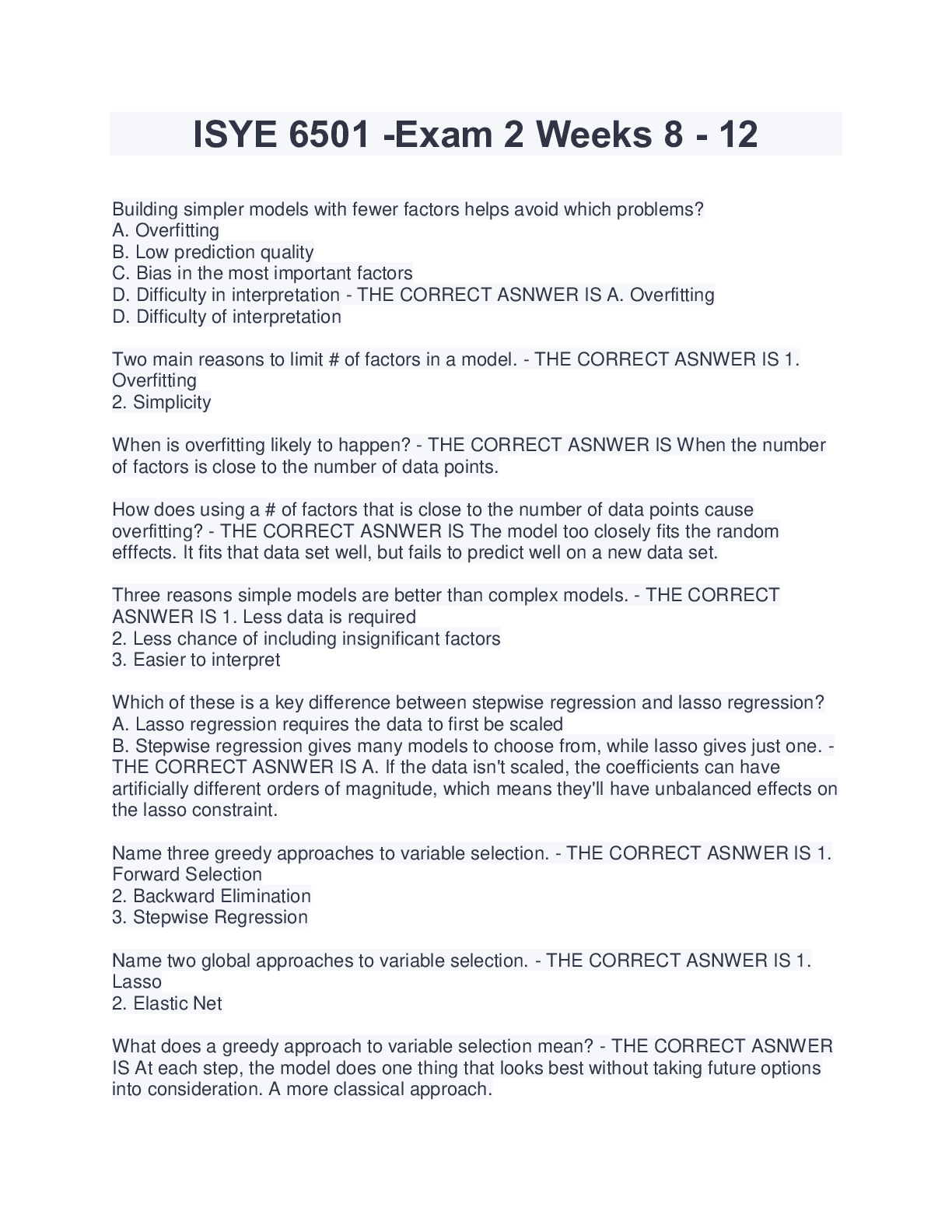

.png)

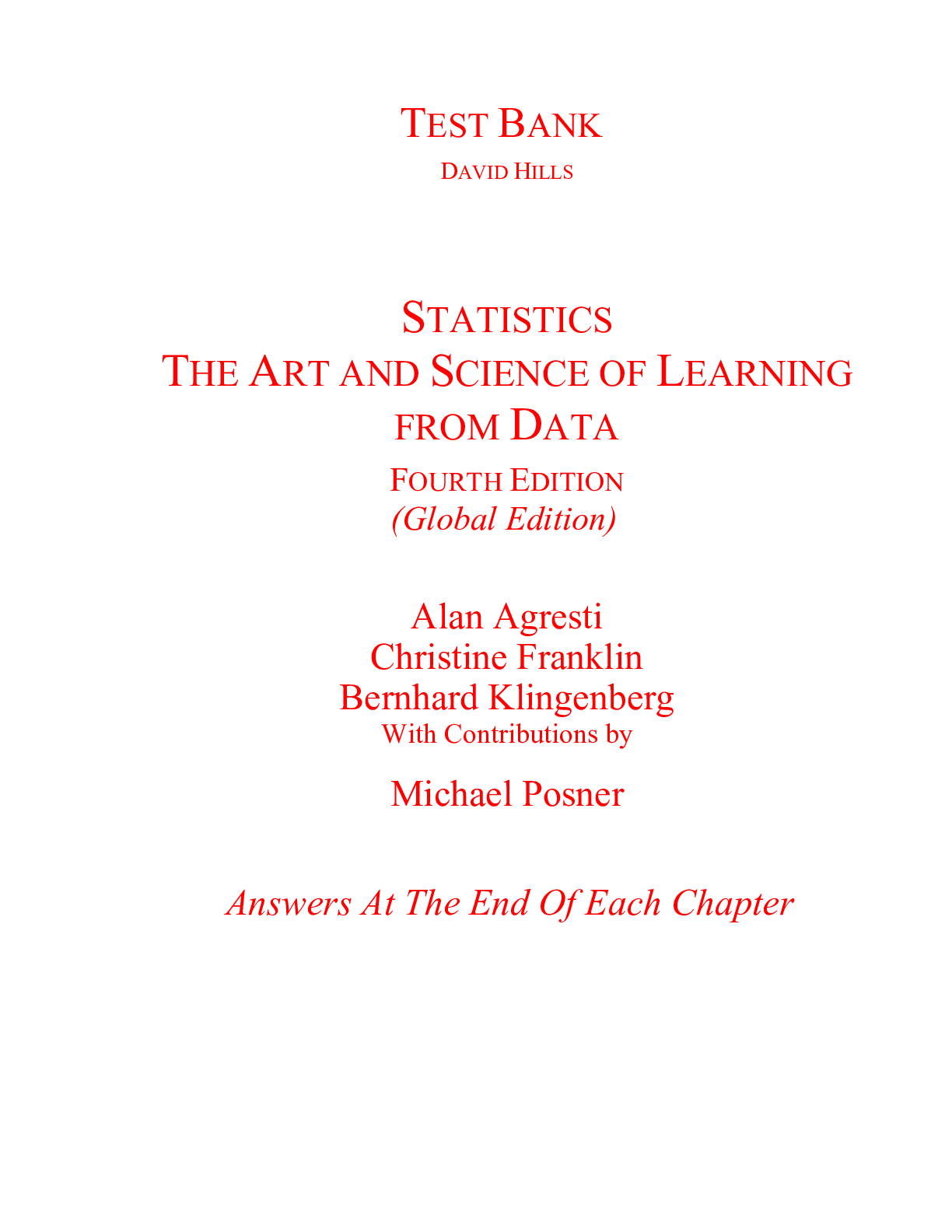

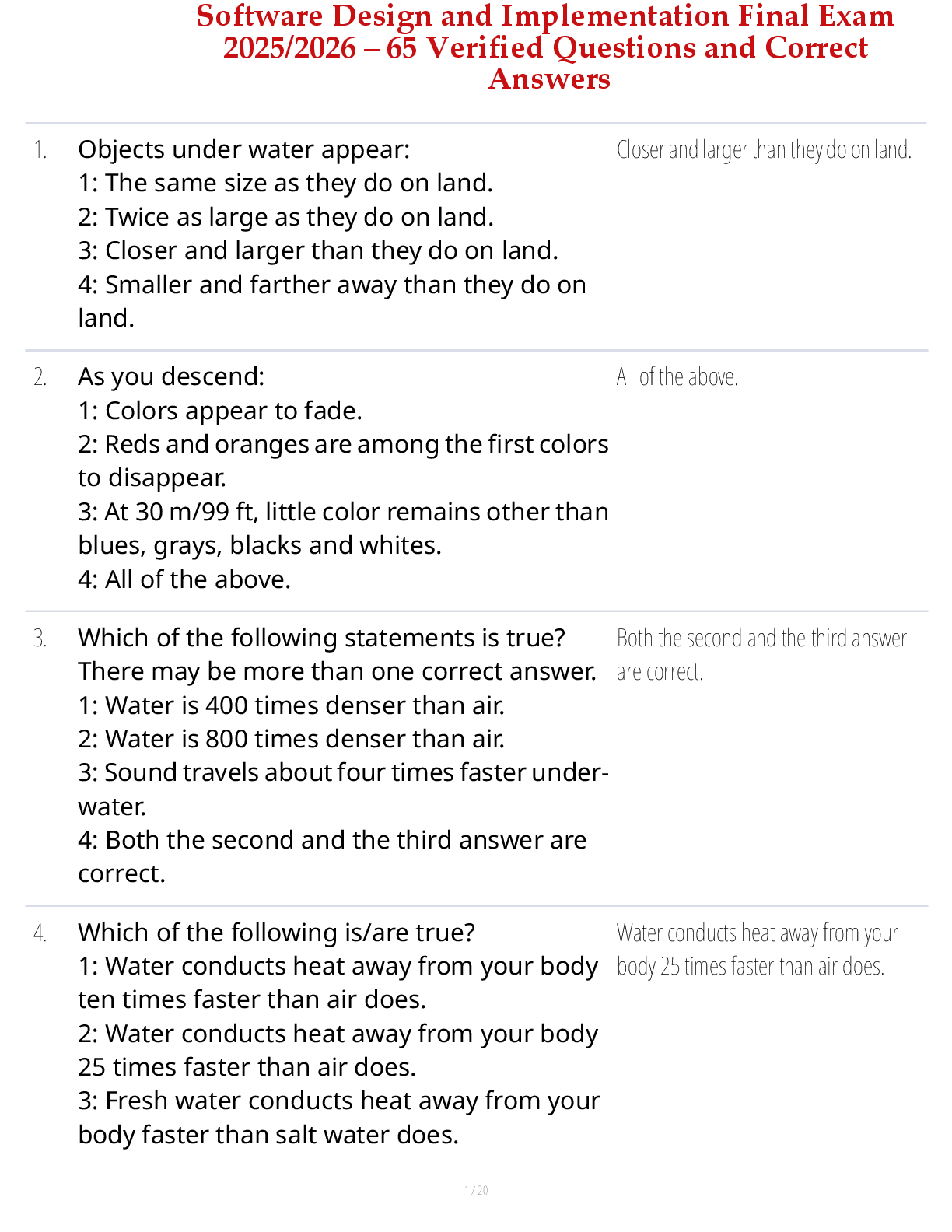

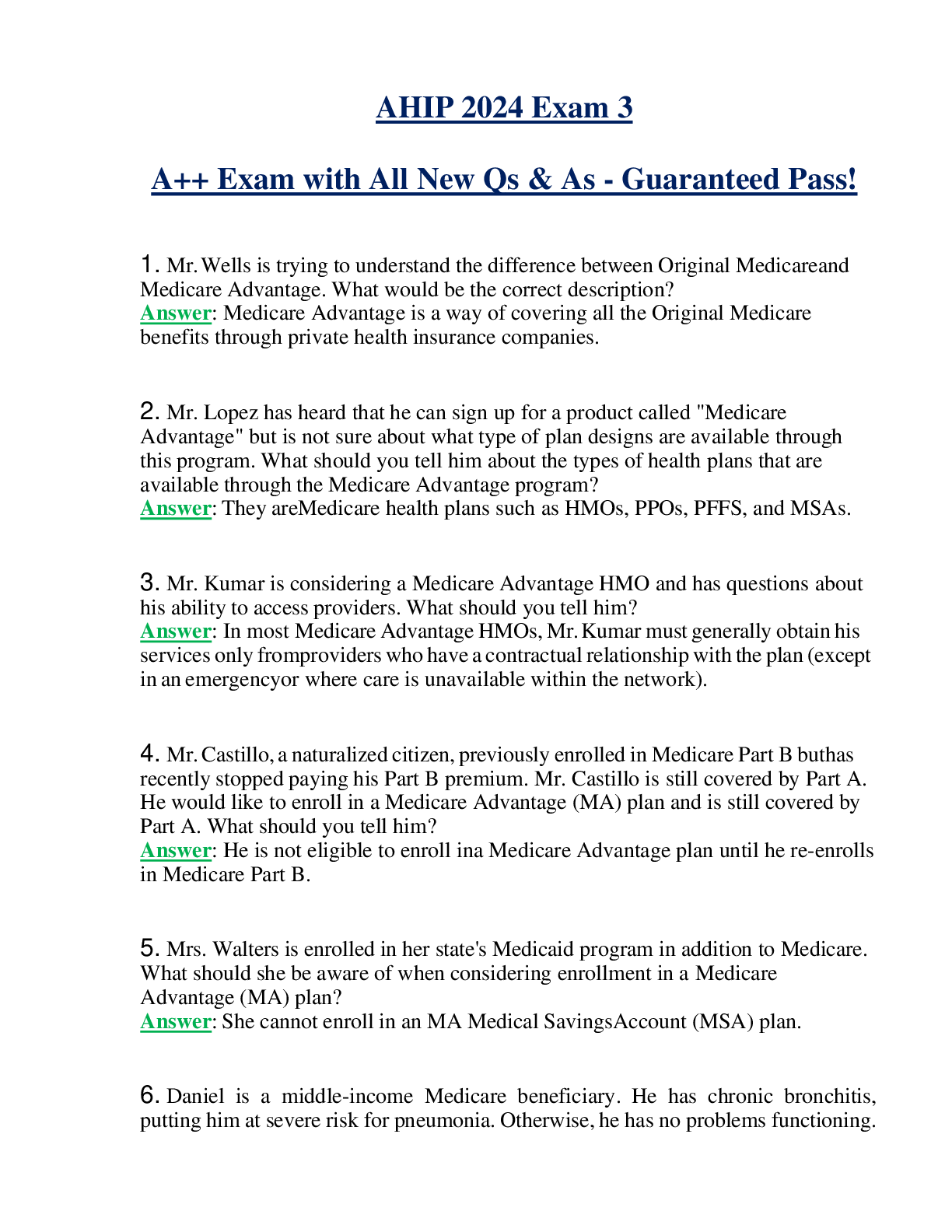

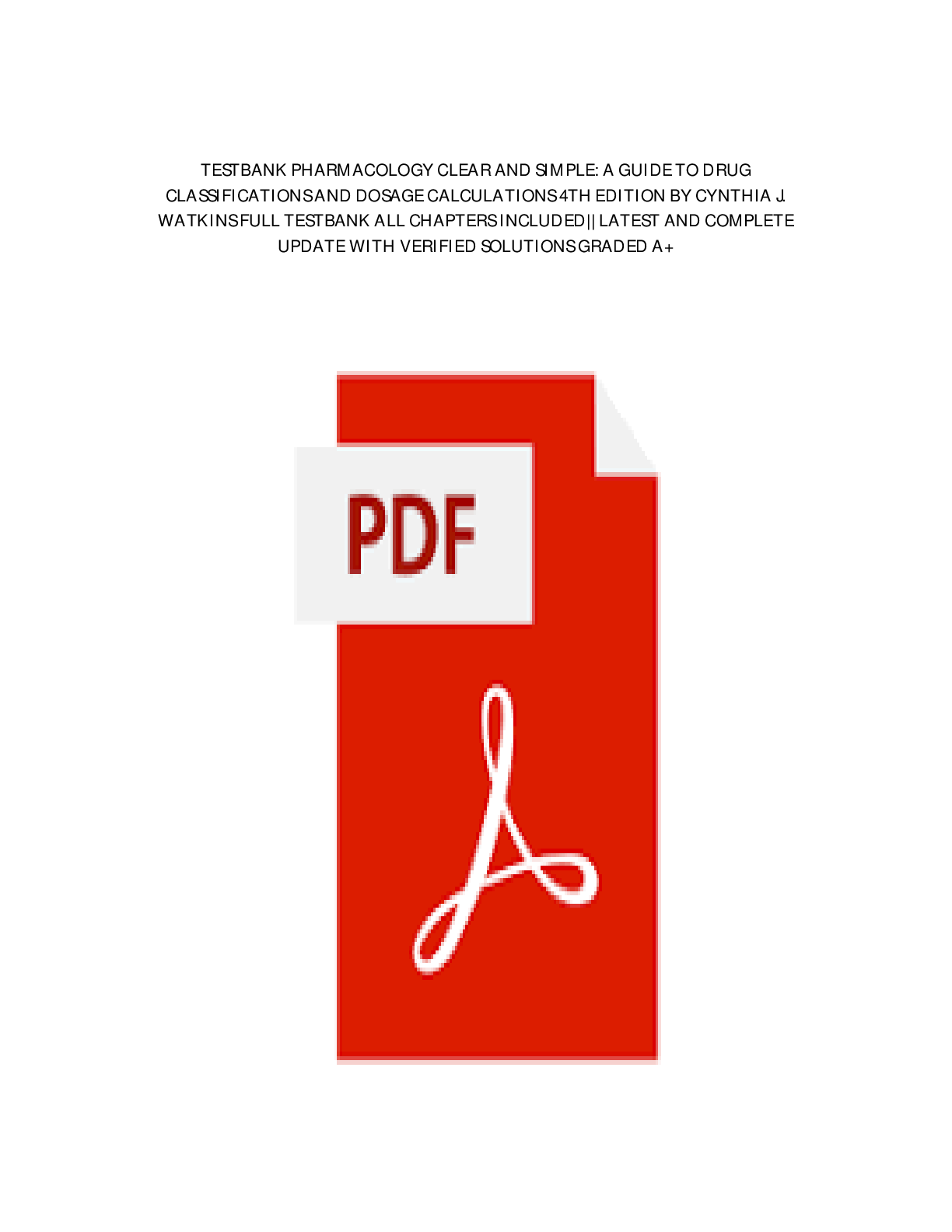
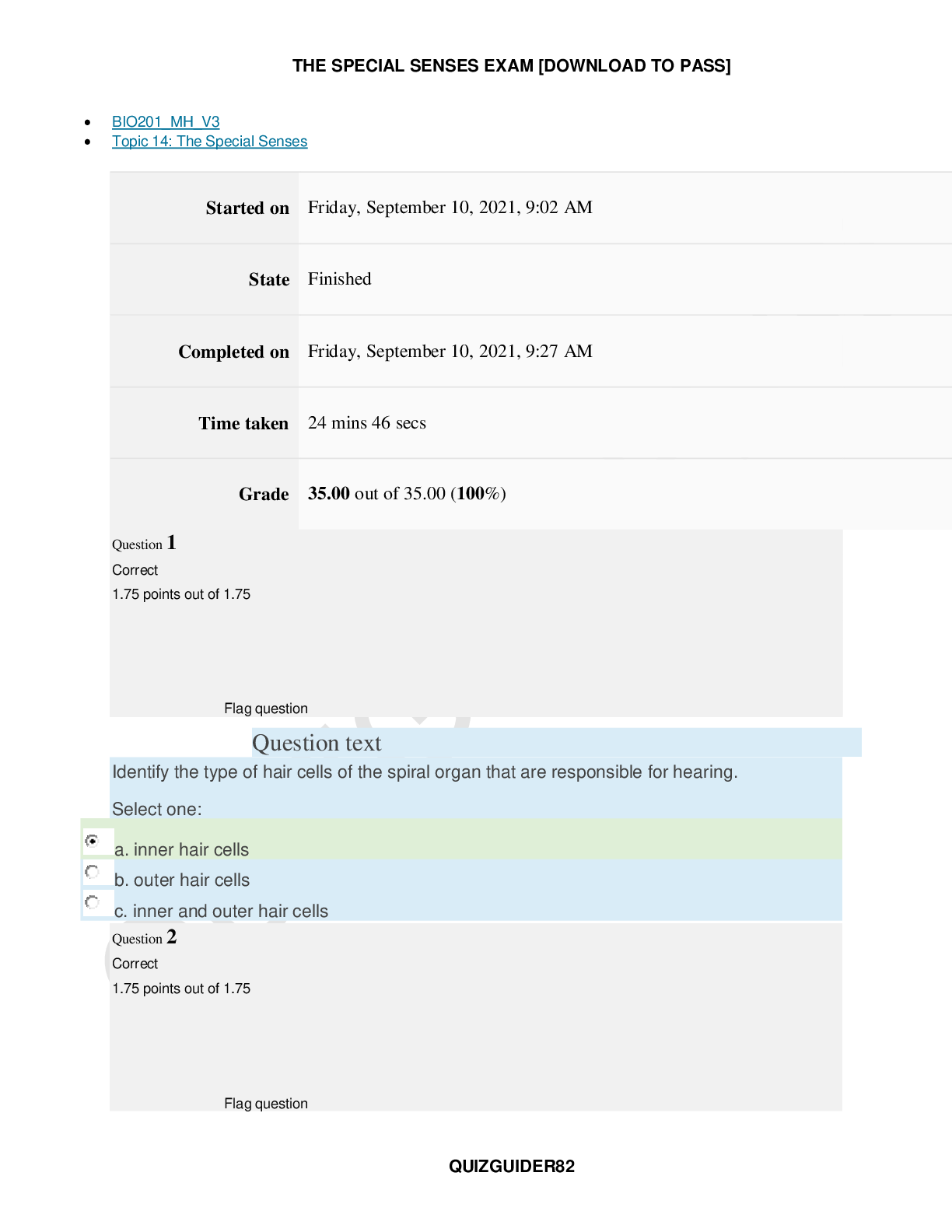
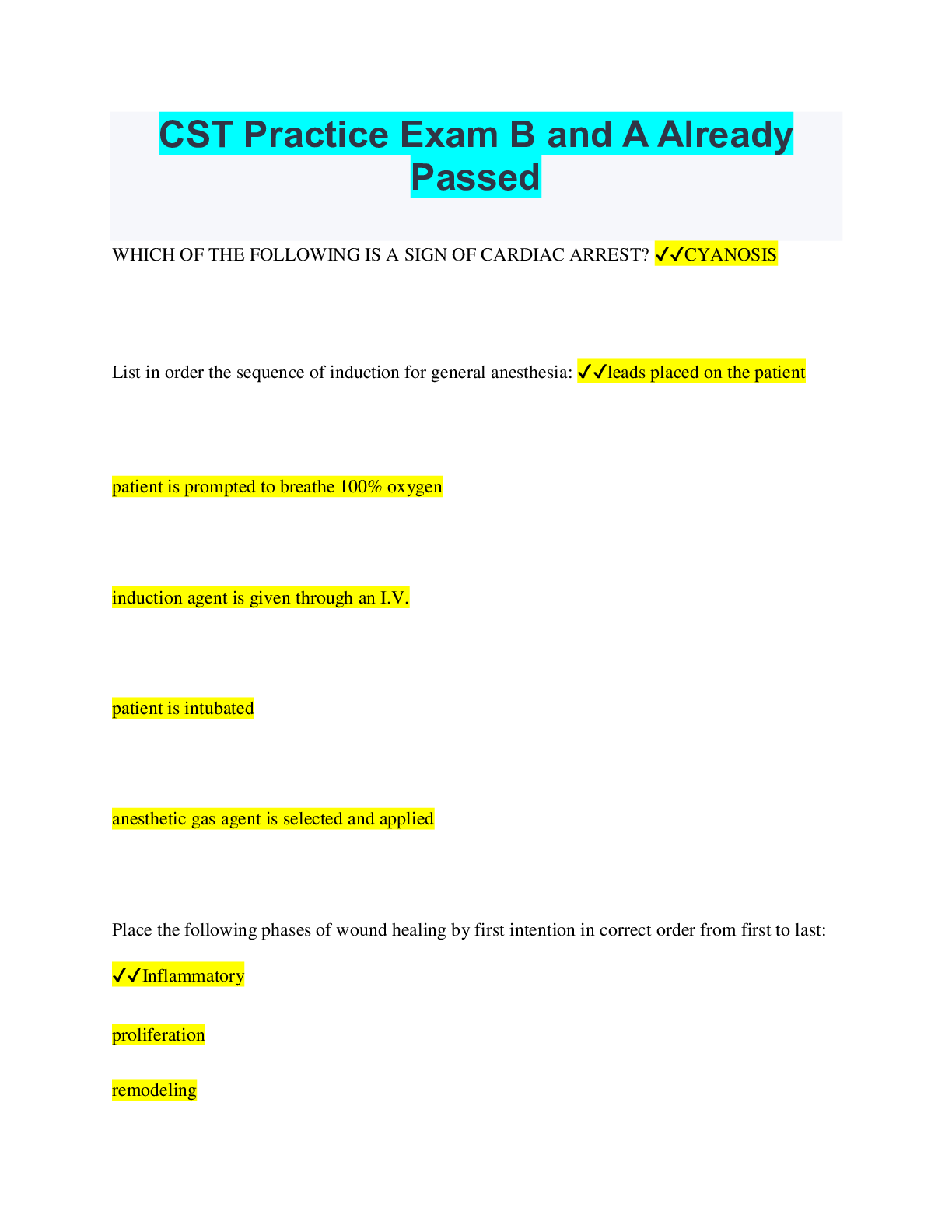
.png)



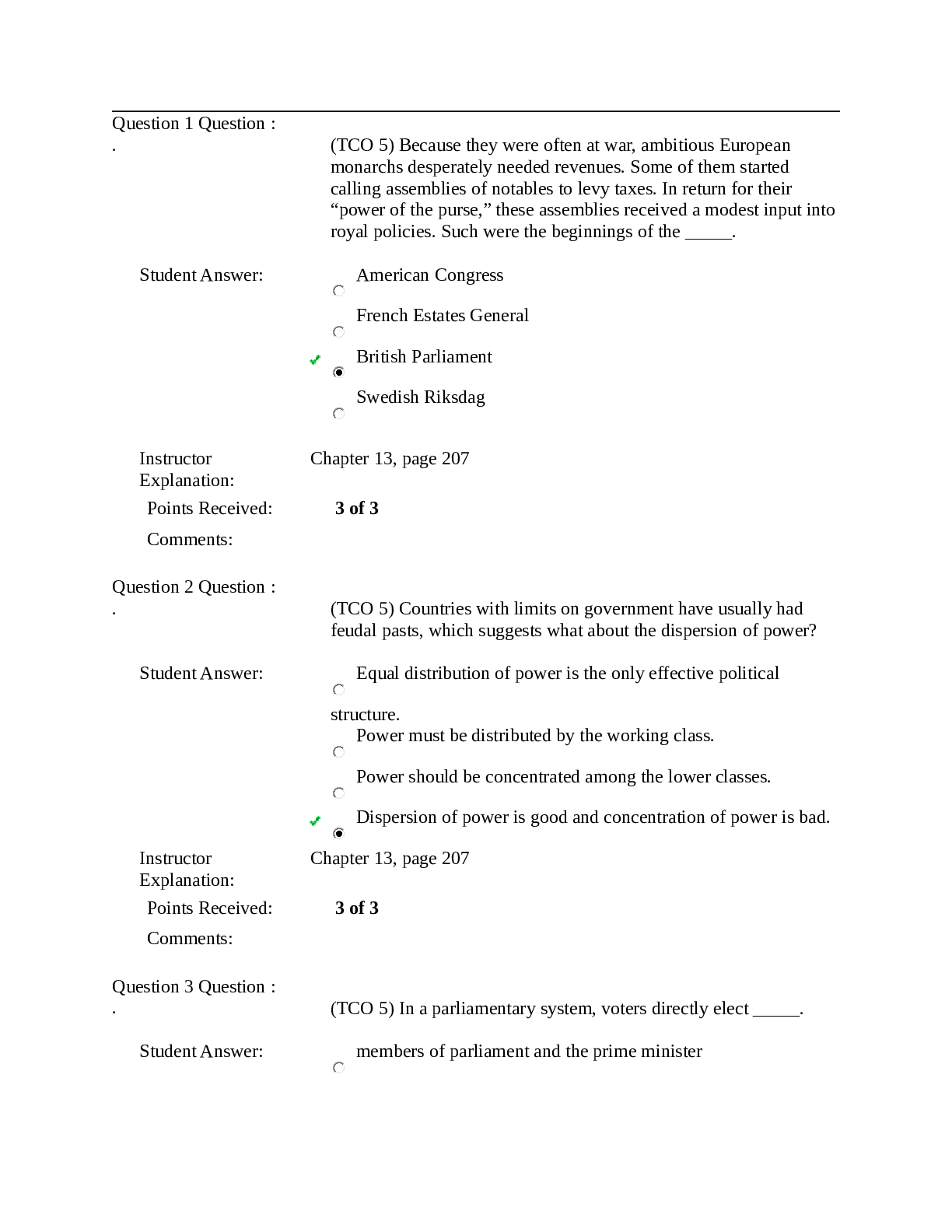
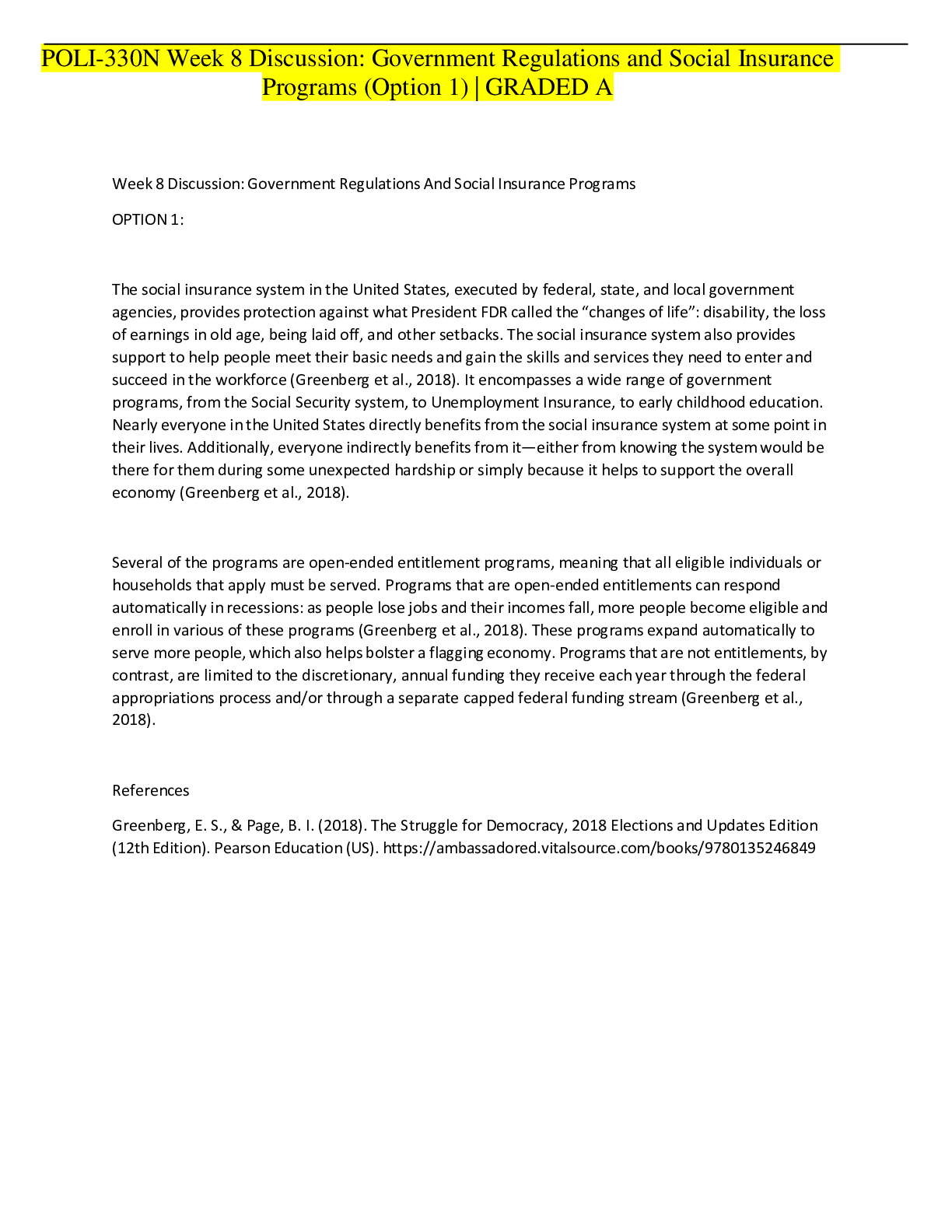


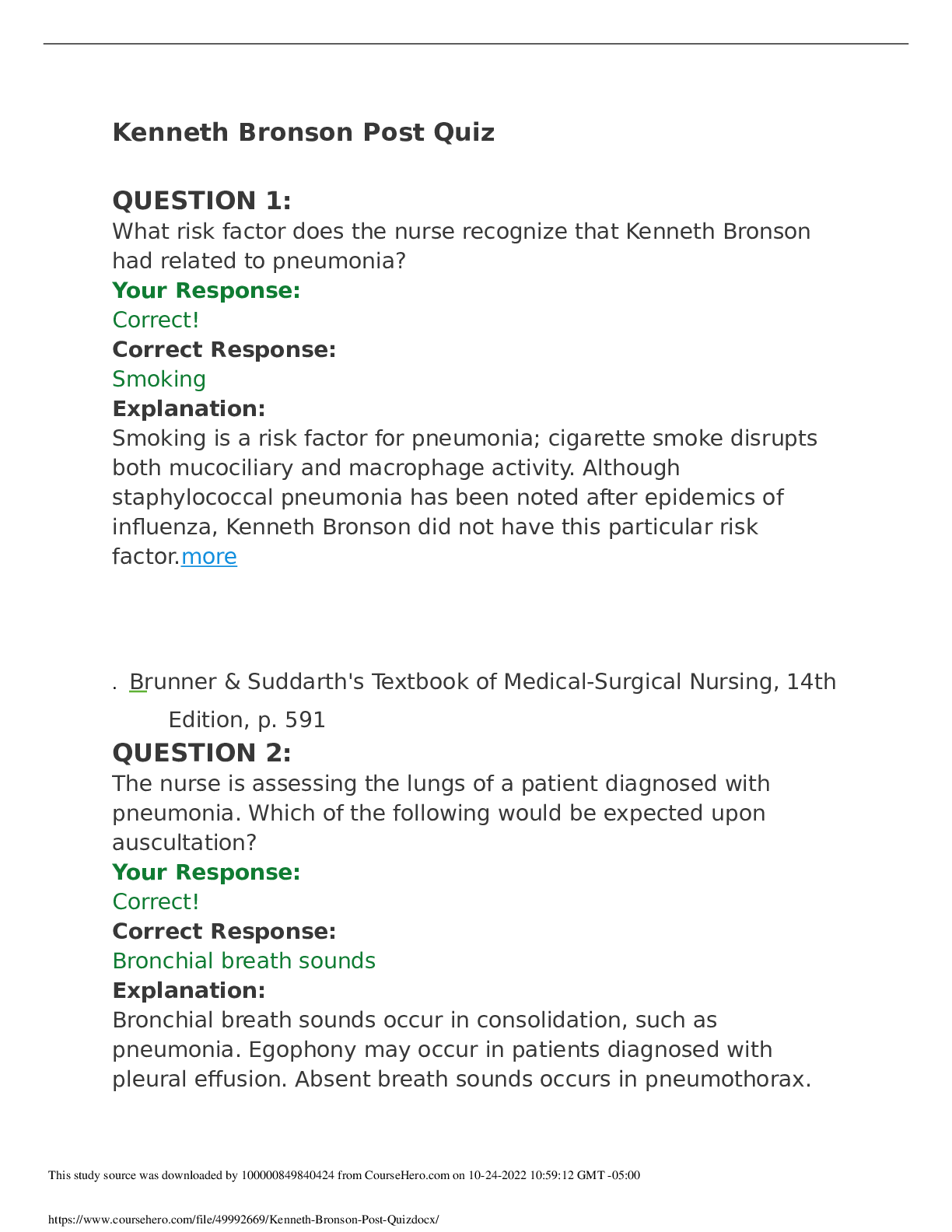

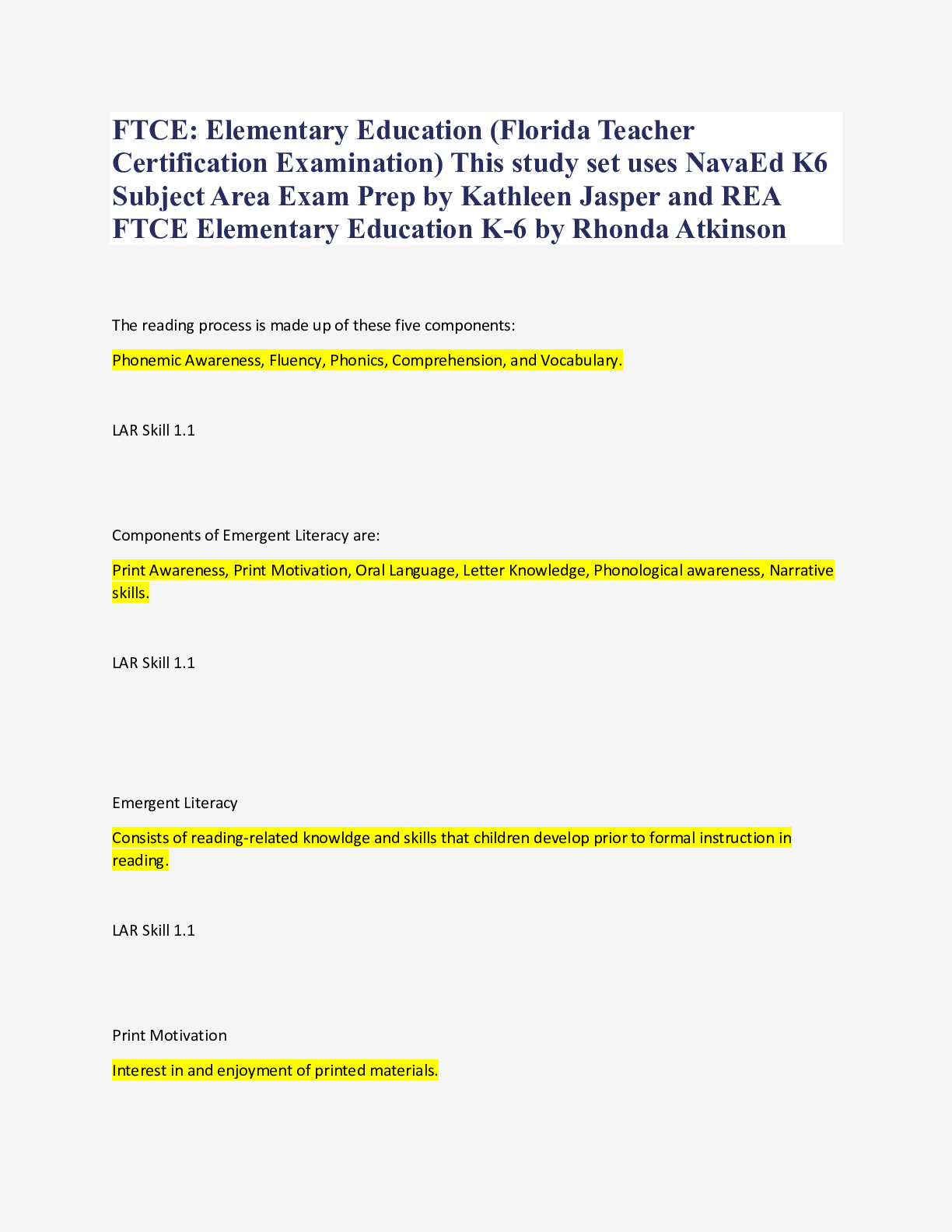

 Questions and Answers 100% VERIFIED.png)
 Questions and Answers 100% correct Solutions.png)



